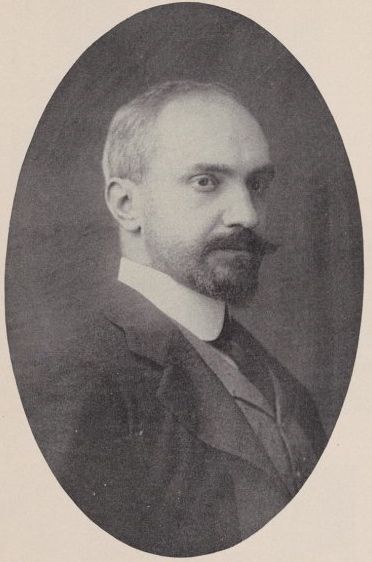 To Henry Ward Abbot
To Henry Ward Abbot
Address: Care of Frau Sturm
Werder Strasse 6 Dresden, Germany
Göttingen, Germany. August 27, 1886
I must thank you at once for your letter. Of course I take an interest in you; what else should I take an interest in except in the doings and thinkings of people who have more or less my own point of view and my own interests, and especially of those among them whom I happen to have met and liked? As you say, we haven’t been great friends in college; but that has an easy explanation. At first I had no friends at all, and after a while, when I could have made many acquaintances, I found the damnable worldliness and snobbishness prevalent at Harvard relegated me to a sort of limbo, the sphere of those who, though they might have committed no actual sin, had not been baptized in the only true Church. Of course such a limbo contained a good many souls; and among them I found some very good friends indeed, whom I by no means would change for others. At the same time, if college society were a little more simple and disinterested, I could have made friends not only in limbo, but also in heaven and hell. In hell I did make some friends, because that, of course, is always possible; but in heaven—unless Herbert Lyman be a cherub—I made no friends at all till the very last; for Ward Thoron must be counted among the fallen angels. You mustn’t think that I am a sorehead, or that I think any fellows intentionally turned me the cold shoulder, because I had little cash and wasn’t in a fashionable set: I know very well that I have a great many tricks that can make people dislike me, and that I lack all the qualities that go to make a popular fellow. I have never had any ambition to be a popular fellow: what I complain of is that a certain artificial state of things at Harvard makes it impossible for a man who is not a popular fellow to have those fellows for his friends who would have been his friends at school, and would be his friends in the world. So that the fact that there has been no “ease of fellowship” as you say, between us at college, is no reason whatever for my not taking an interest in you or for concluding that we really belong to different spheres. Certainly, after reading your letter, I am sure that you are just the man with whom I should like to talk things over. You have, whatever you may say, the contemplative disease; and what is more, you are able to escape the conclusions which people agree to be the proper one’s to arrive at, although I fancy you feel a little wicked for doing so. For instance, what you say of your family, although the effort you make to say it perhaps leads you to exaggerate, shows that you can open your eyes to look at those truths which it is considered wrong to see. It is wrong to see that right and truth may be subjective, imaginary things, or that one’s family may be very much in one’s way; yet you are willing to consider these heresies. But although your letter confirms my belief that you ought to go into the idea business rather than into any other, I see that you can’t do so now. Of course a man shouldn’t quarrel with his bread and butter, nor with his family even if he had his own bread and butter already. But if you go into business to please your mother or your grandfather, it is a great deal better than if you went into business to please yourself; you will in all probability not lose your taste for intellectual things, nor get very much absorbed in your employment. I myself would not hesitate to go into business if circumstances made it necessary for me to do so; nor would I think I was selling my birthright for my mess of potage. For after all our birthright is our love of observing; and a man can study the world in one place as well as in another. If you have an ambition to write novels, you lose nothing by going to an office every morning, where the values of men can be learned as well as the values of cotton and sugar.
[A]lthough I am awfully sorry you can’t be within reach of me this winter, I see no reason why you should regret your situation. Of course it is not ideal, since you are not as free as one likes to be—not as free, perhaps, as I am; because my family, having nothing to bribe me with, are very willing that I should follow my inclinations, and even help me as much as they are able. But your mother was not mistaken when she thought me an ungrateful son: I am ungrateful; because the amount of space occupied in my mind by my family and my obligations to them is infinitesimal compared with the amount occupied by . . . my own ambitions. My father, who is very shrewd and cynical, and my mother who is determined and unselfish, & always ready to face fortune, both perceive this, and acquiesce in it. They know perfectly well that I like to be away from home, because I tell them so; but of course they also see that it is good for me. I am not the most comforting and loving of sons—but naturally they can’t blame me for existing or being more or less as I am.—But although you are not as free as one likes to be, you probably will have leisure enough to read a little, and a good opportunity of seeing the world. Besides, as some old Roman said, to know well the ways of men, one house is enough. So I shall be expecting your first novel, as well as the news of your engagement to that divine creature which you so generously assign to me. By the way, I do not expect that either you or I can do as much as Stimson, whom I admire very much; but we can help make that atmosphere in which Stimsons bloom, and perhaps even greater men. We can’t expect to be geniuses (and I believe Stimson has the quality, in what degree we cannot yet tell) but we can be lovers of the things of which geniuses are masters; we can be, like Norton, maggots in the big men’s cheese. And for myself, being a supercilious and Epicurean maggot, I like cheese better than Philistine potatoes.
I am not insensible to the sincere compliment you pay me by giving me your confidence to the extent you do; but for God’s sake, no compliments of any other kind. I don’t know how much water there may be in my stream; but I am sure that many a sluggish river has more. I have not had the chance to stagnate; I have been shut in and forced down in one single direction, and much of my force comes from my limitations. I have as much to admire in you or in anyone (for I am not flattering) as you or anyone can have to admire in me. I am a slightly different specimen—more or less curious—a little rare, perhaps, because an imported article. But if you think it worth while to write to me, why, I shall be very glad, very glad indeed, to write to you, and preach your patience out. You may be able to be a little franker with me than with most people, because being an antimoralist in sympathies as well as in theory, I will not think any the worse of you for telling me what is psychologically (or, as in Ward’s case, physiologically) true of you. I know before hand that at the bottom of things spiritual is darkness, and at the bottom of things physical, filth; but I think it a pleasant thing for a few persons (and there have always been such) to say it to each other in a decent way. It will also be a great pleasure for me to hear through you about other fellows, and when the time comes, about the woman to be deeply and sincerely loved—by you.
From The Letters of George Santayana: Book One, [1868]-1909. Cambridge, MA: The MIT Press, 2001.
Location of manuscript: Butler Library, Columbia University, New York NY.
